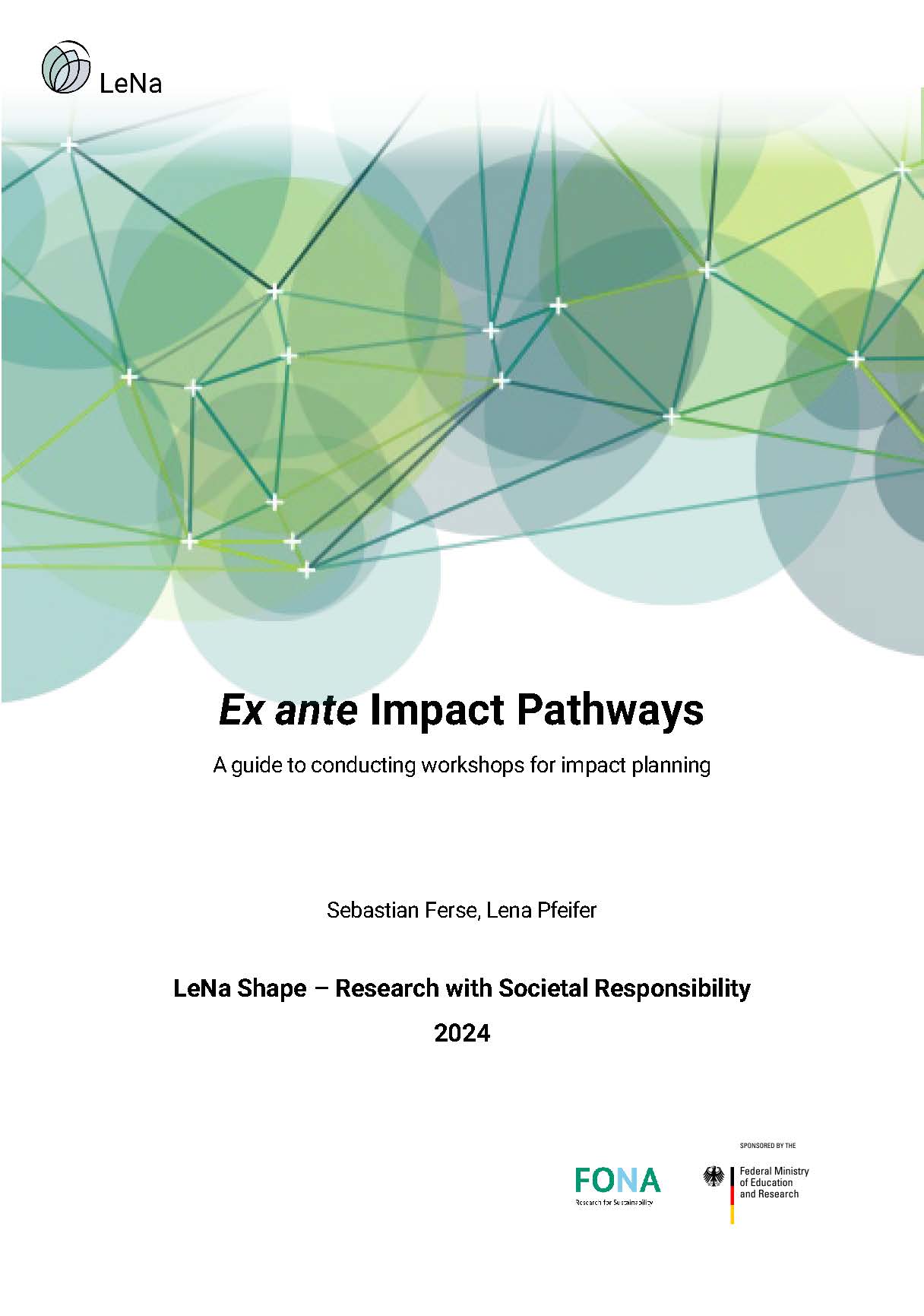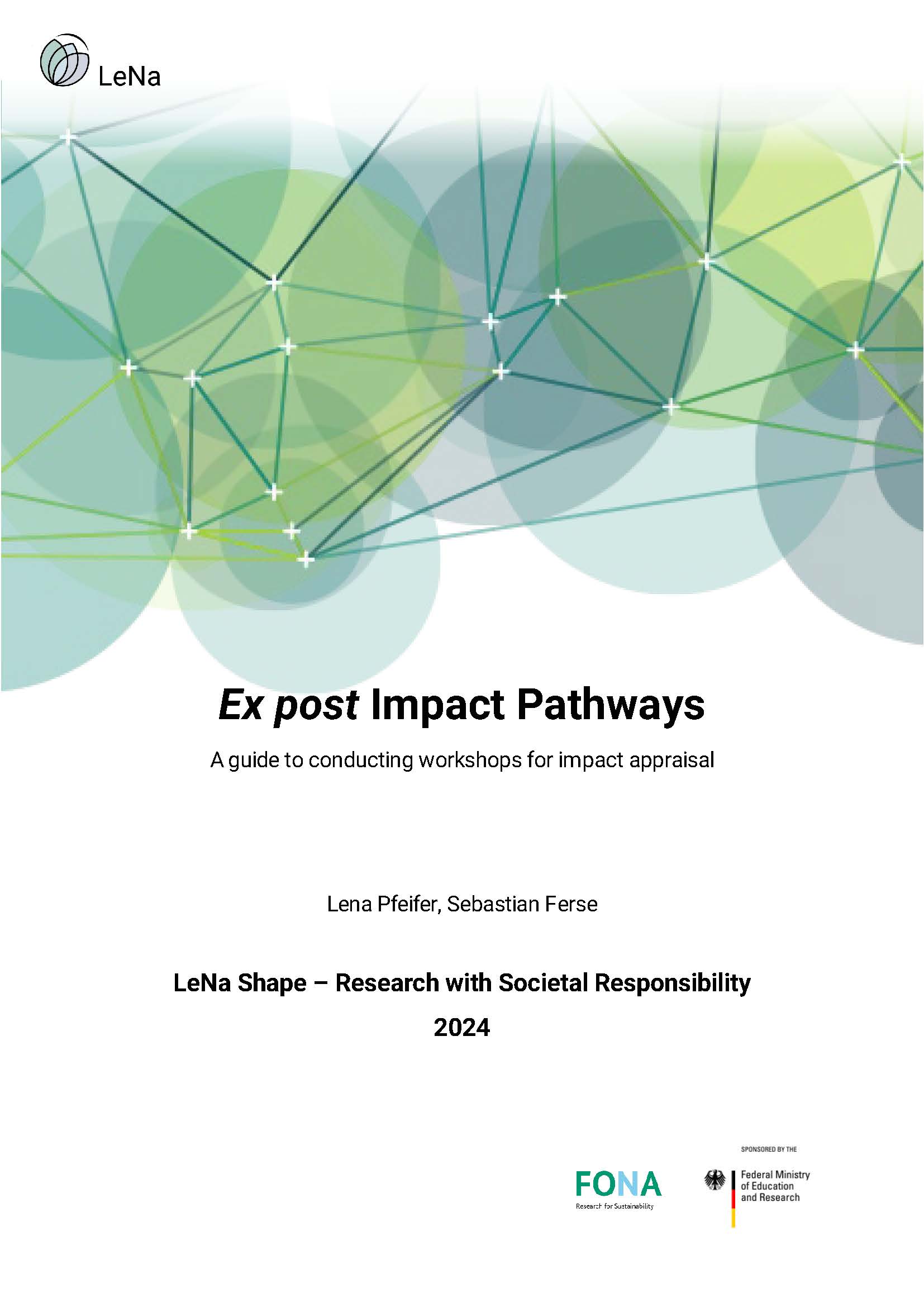Summary
This guide is meant to assist in the planning and conducting of workshops for the structured definition and planning of impacts and impact pathways for research projects in a forward-looking manner. It describes the underlying steps and suggestions for independent planning and implementation of workshops. The workshops serve both to ensure targeted, impact-oriented project planning and to enable impact planning at an individual project and a programmatic level. The guide draws on a series of workshops conducted in 2023 at the Leibniz Centre for Agricultural Landscape Research (ZALF) and the Leibniz Centre for Tropical Marine Research (ZMT) in the frame of the project LeNa Shape, funded by the German Federal Ministry of Education and Research (BMBF, grant numbers 01UV2110F-G). LeNa Shape addresses sustainability and the societal responsibility of research, and has among its goals to enable researchers in reflecting upon their research activity, including its societal impacts.
The guide contains a description of the different parts of the workshops, a suggested schedule to assist in the time planning, and templates for the creation of whiteboards. The workshops can be conducted both on site and virtually. The use of pre-arranged virtual whiteboards for collaborative work is strongly recommended, particularly if workshops are held virtually. Familiarity with the concepts of societal impacts and impact planning is not required for participants, but workshop organizers and facilitators should have a sound understanding of the underlying concepts and approaches. As a broad literature and a wealth of resources exist for impact planning, this guide does not provide an in-depth background of the methods used, but includes references for further reading.
The workshop series described in this guide has been developed in the context of natural resource use and management. While the general concepts are widely applicable to different research fields, some of the examples and approaches used (e.g., the criteria and indicator sets in workshop 2) will need to be adjusted according to context and research fields.
You can download the full guide here: Ex ante Impact Pathways - A guide to conducting workshops for impact planning
Title: Ex ante Impact Pathways - A guide to conducting workshops for impact planning
Authors: Sebastian Ferse, Lena Pfeifer
DOI: https://doi.org/10.21244/zmt.2024.001
LeNa Shape – Research with Societal Responsibility, 2024
Suggested citation:
Ferse S.C.A., Pfeifer L. (2024) Ex ante Impact Pathways. A guide to conducting workshops for impact planning. Prepared as part of the LeNa Shape project. Leibniz Centre for Tropical Marine Research (ZMT) Bremen GmbH and Leibniz Centre for Agricultural Landscape Research (ZALF) e.V. Müncheberg, Germany. doi: 10.21244/zmt.2024.001
Summary
This guide is meant to assist in the planning and conducting of a workshop for the structured assessment and appraisal of impacts and impact pathways for research projects near or subsequent to their completion. It describes the underlying steps and suggestions for independent planning and implementation of workshops. These workshops serve to enhance the understanding of impacts resulting from a research project, allowing for the demonstration and reporting of impacts e.g. to funders or a comparative appraisal of different initiatives, as well as to enhance impact literacy by individual researchers or at the institutional level. The guide draws on a series of workshops conducted in 2022 at the Leibniz Centre for Agricultural Landscape Research (ZALF) and the Leibniz Centre for Tropical Marine Research (ZMT) in the frame of the project LeNa Shape, funded by the German Federal Ministry of Education and Research (BMBF, grant numbers 01UV2110F-G). LeNa Shape addresses sustainability and the societal responsibility of research, and has among its goals to enable researchers in reflecting upon their research activity, including its societal impacts.
The guide contains a description of the different parts of the workshop, a suggested schedule to assist in the time planning, and templates for the creation of whiteboards. The workshop can be conducted both on site and virtually. The use of pre-arranged virtual whiteboards for collaborative work is strongly recommended, particularly if workshops are held virtually. Familiarity with the concepts of societal impacts and impact planning is not required for participants, but workshop organizers and facilitators should have a sound understanding of the underlying concepts and approaches. As a broad literature and a wealth of resources exist for impact assessment, this guide does not provide an in-depth background of the methods used, but includes references for further reading.
The workshop described in this guide has been developed in the context of natural resource use and management. While the general concepts are widely applicable to different research fields, some of the examples and approaches used (in particular the impact criteria and indicator sets) will need to be adjusted according to context and research fields.
You can download the full guide here: Ex post Impact Pathways - A guide to conducting workshops for impact appraisal
Title: Ex post Impact Pathways - A guide to conducting workshops for impact appraisal
Authors: Sebastian Ferse, Lena Pfeifer
DOI: https://doi.org/10.21244/zmt.2024.002
LeNa Shape – Research with Societal Responsibility, 2024
Suggested citation:
Pfeifer L., Ferse S.C.A. (2024) Ex post Impact Pathways. A guide to conducting workshops for impact appraisal. Prepared as part of the LeNa Shape project. Leibniz Centre for Tropical Marine Research (ZMT) Bremen GmbH and Leibniz Centre for Agricultural Landscape Research (ZALF) Müncheberg, Germany. doi: 10.21244/zmt.2024.002.






